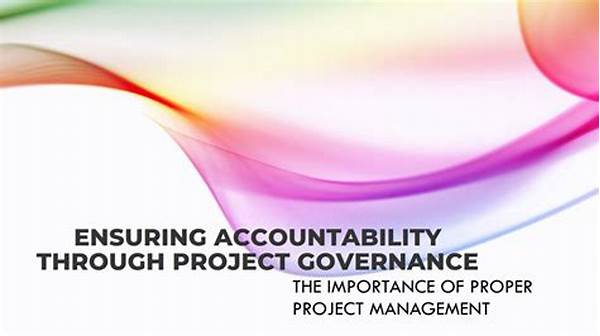In today’s complex and interconnected world, integrated governance has emerged as a pivotal mechanism for streamlining and enhancing the efficacy of governance processes. It involves the coordination of various levels of governance structures, aiming to synchronize efforts across sectors, governments, and stakeholders. However, while integrated governance holds the promise of creating more efficient and cohesive systems, it also presents challenges, notably in ensuring accountability. Accountability in this context refers to the obligation of entities and individuals involved in governance to be answerable for their actions and decisions, ensuring transparency, integrity, and responsiveness. As integrated governance becomes increasingly prevalent, it is imperative to establish robust frameworks that ensure accountability, thus safeguarding the interests of the public and fostering trust.
Read Now : Enhancing Workshops With Visual Storytelling
The Importance of Accountability
In integrated governance, accountability functions as a cornerstone that supports the entire governance framework. Ensuring accountability in integrated governance is essential for maintaining the public’s trust and promoting transparency. By holding entities and individuals accountable, it becomes possible to ensure that resources are used efficiently and that decisions are made in the best interest of all stakeholders involved. Moreover, accountability mechanisms help detect and mitigate risks of corruption and maladministration, which can erode public confidence and undermine governance initiatives. Therefore, establishing clear lines of responsibility and implementing rigorous monitoring and evaluation processes is crucial. This enables an environment where feedback and performance can be assessed objectively, ultimately leading to continuous improvement in governance practices.
Mechanisms for Ensuring Accountability
1. Transparency: Open access to information is vital in ensuring accountability in integrated governance, allowing stakeholders to scrutinize decisions and actions.
2. Performance Metrics: Establishing key performance indicators helps in objectively measuring the outcomes of governance processes.
3. Auditing and Oversight: Regular audits and oversight mechanisms ensure adherence to regulations and standards.
4. Stakeholder Engagement: Engaging diverse stakeholders ensures varied perspectives and enhances decision-making.
5. Legal Frameworks: Robust legal structures provide a basis for enforcing accountability measures.
Challenges in Implementing Accountability Measures
While the benefits of ensuring accountability in integrated governance are well-documented, the implementation of these measures can present significant challenges. The complexity of integrated governance systems can sometimes lead to ambiguous accountability lines, making it difficult to pinpoint responsibility. Diverse stakeholders with varying interests and objectives can create conflicts, further complicating accountability efforts. Additionally, resource constraints often limit the effective deployment of accountability mechanisms, especially in developing regions. Overcoming these challenges requires a comprehensive approach that includes capacity-building initiatives and the provision of adequate resources to ensure that accountability is deeply embedded in governance structures. Policymakers must strive to resolve these issues to harness the full potential of integrated governance.
The Role of Technology
1. Digital Platforms: Leveraging technology and digital platforms can streamline processes and enhance transparency.
2. Data Analytics: Data analytics helps monitor and evaluate the effectiveness of governance interventions.
3. E-Governance: Implementing electronic governance systems aids in efficient documentation and record-keeping.
4. Online Portals: Online portals for stakeholder feedback enhance participation and accountability.
5. Cybersecurity Measures: Implementing strong cybersecurity measures protects against data breaches and ensures data integrity.
Read Now : Recognized Online Academic Credentials
6. Communication Tools: Advanced communication tools facilitate better coordination and information sharing among stakeholders.
7. Automation: Automating repetitive processes can reduce errors and improve efficiency.
8. Real-time Monitoring: Real-time monitoring tools enable the continuous assessment of governance processes.
9. Artificial Intelligence: AI can provide insights and predictive analytics to refine governance strategies.
10. Blockchain Technology: Blockchain ensures immutable records, enhancing accountability and security.
11. Cloud Computing: Cloud technologies provide scalable and accessible solutions for governance systems.
12. Virtual Collaboration Platforms: These platforms enable seamless interaction among geographically dispersed stakeholders.
Enhancing Oversight and Evaluation
In the context of ensuring accountability in integrated governance, robust oversight and evaluation mechanisms play a critical role. Effective monitoring strategies help track performance and assess compliance with established policies and guidelines. Evaluations should be conducted regularly, employing both qualitative and quantitative methods to gather comprehensive insights. Feedback loops are essential in this process, ensuring that lessons learned are integrated into future governance strategies. Furthermore, third-party evaluations can provide unbiased assessments, increasing credibility and trust in governance initiatives. Transparent reporting on findings and actions taken in response to evaluations is necessary to demonstrate commitment to accountability and continuous improvement, ultimately strengthening the governance framework.
Conclusion
In summary, ensuring accountability in integrated governance is a multifaceted endeavor that requires intentionality and a strategic approach. The integration of diverse governance systems, while beneficial, necessitates stringent accountability measures to maintain efficiency and public confidence. Prioritizing transparency, stakeholder engagement, and leveraging advanced technological solutions are fundamental in this pursuit. Despite challenges such as resource limitations and complex stakeholder dynamics, embracing these principles can significantly enhance governance outcomes. Through continuous evaluation and adaptation, governments and organizations can build resilient and accountable governance systems that effectively address contemporary challenges and foster sustainable development for all.
